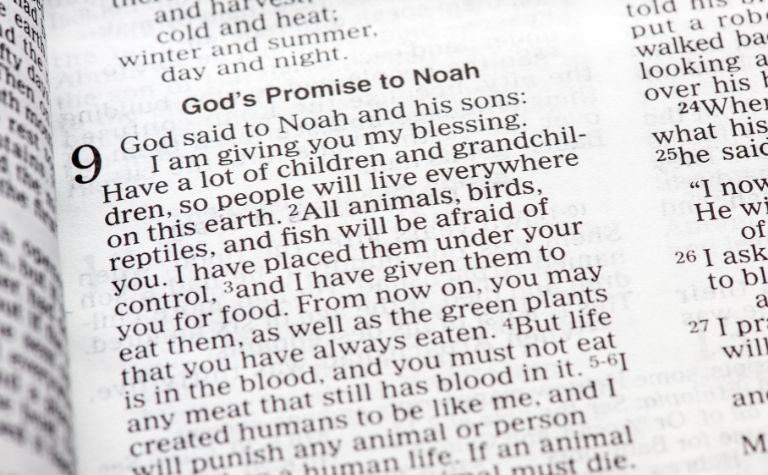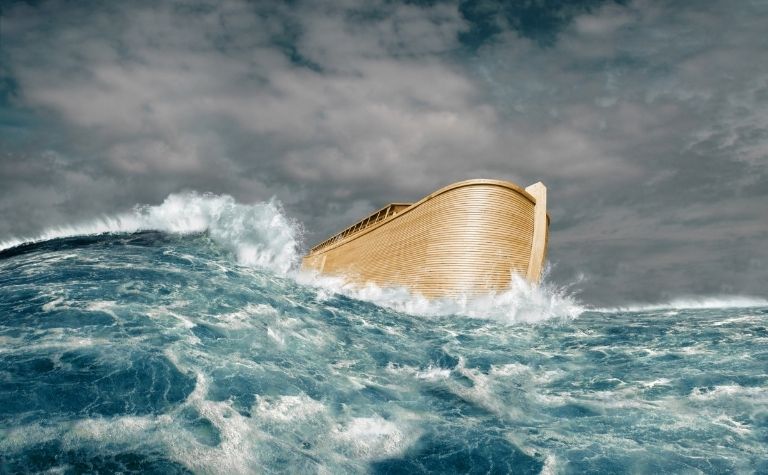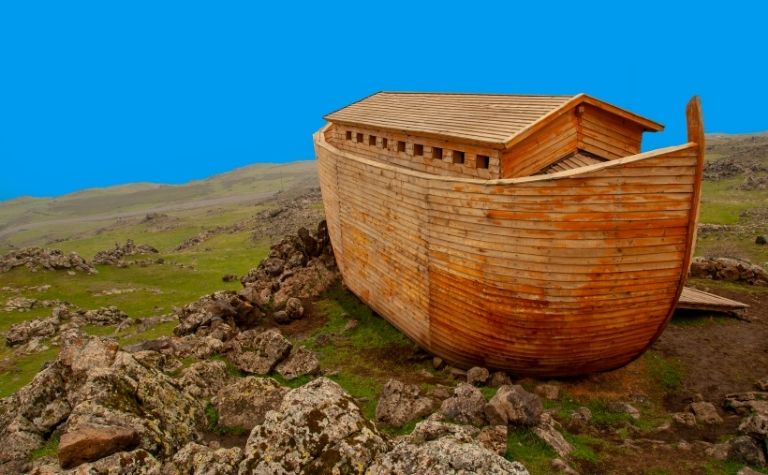Noah stands out to Bible readers because of the flood story. Yet, he first stood out to God because of his righteousness (Gen. 6:9). The New Testament mentions Noah, along with Abraham, Moses, and David, as a person of extraordinary faith (Heb. 11). His story in Genesis primarily relates to the worldwide flood. One question many people have about Noah is how old he was when he built the ark.
If many Genesis scholars are correct that the ark took approximately a century to build, Noah was around 500 years old when the construction started and turned 600 just after its completion. This calculation comes from the revelation that the flood began 77 days after Noah turned 600.
Why does the flood story mention Noah’s age multiple times? How long did it take Noah to build the ark? What moments within the flood story does Genesis date? What does the New Testament say about Noah? Keep reading to learn the answers to these questions and others.
Also see How Long Did It Take Noah To Build the Ark? to learn more.

Why does the flood story mention Noah’s age multiple times?
The Gregorian calendar, the most common method of tracking time in the world today, marks years using the birth of Jesus Christ as its fixed point. Even the current practice of replacing B.C. (“Before Christ”) with B.C.E. (“Before Common Era”) and A.D. (“Anno Domini,” in the year of our Lord) with C.E. (“Common Era”) still uses Jesus’ birth to mark time.
To date time in the Old Testament, many writers used the current king or ruler to mark the year that an event occurred. This technique is widespread in the historical and prophetic sections of the Old Testament (e.g. Isa. 6:1). Similarly, though Noah isn’t a king or ruler, Genesis uses his life to mark key moments of the flood story, which helps readers track his age throughout the story.
The first time Genesis mentions Noah’s age
The first time readers encounter a reference to Noah’s age is in the genealogy at the conclusion of Genesis chapter five, one chapter before the flood story starts. The genealogy begins with Adam (Gen. 5:3-5) and ends with Noah (Gen. 5:32).
The descriptions of all the patriarchs mentioned in Genesis five start with the age that they started to have children, and most end with the total years of their life and the phrase “and then he died” (ESV).
For example, “When Methuselah had lived 187 years, he fathered Lamech. Methuselah lived after he fathered Lamech 782 years and had other sons and daughters. Thus all the days of Methuselah were 969 years, and he died.” (Gen. 5:25-27).
There are two exceptions to this pattern. The first is Enoch, who didn’t die because “God took him” (Gen. 5:24). The second is Noah. His description includes the age when he started having children but then ends abruptly. “After Noah was 500 years old, Noah fathered Shem, Ham, and Japheth” (Gen. 5:24). Readers don’t learn the age Noah was at his death until the end of the flood story” (Gen. 9:29).
The next several references Genesis makes to Noah’s age are in relation to the flood narrative. The fixed point in time referenced throughout the story is Noah’s age.
Also see How Long Did Noah Live? to learn more.

The second time Genesis mentions Noah’s age
The second time Genesis refers to Noah’s age is the first time it refers to it in relation to the flood. Genesis reveals that “Noah was six hundred years old when the flood of waters came upon the earth” (Gen. 7:6). This description is general compared to the precise dates that occur later in the story.
The third time Genesis mentions Noah’s age
Demonstrating extraordinary precision, the third time Genesis refers to Noah’s age, which it does in relation to floodwaters, marks it to the day. “In the six hundredth year of Noah’s life, in the second month, on the seventeenth day of the month, on that day all the fountains of the great deep burst forth, and the windows of the heavens were opened” (Gen. 7:11).
The fourth time Genesis mentions Noah’s age
The fourth time Genesis mentions Noah’s age is also a reference to a specific day but a different year. Genesis 8:13 reads, “In the six hundred and first year, in the first month, the first day of the month, the waters were dried from off the earth. And Noah removed the covering of the ark and looked, and behold, the face of the ground was dry” (Gen. 8:13).
The fifth time Genesis mentions Noah’s age
The fifth time Genesis mentions Noah’s age is another reference to him being 601 years old. Genesis 8:14 reads, “In the second month, on the twenty-seventh day of the month, the earth had dried out” (Gen. 8:14).
Other dates mentioned near the end of the flood story also use Noah’s age as a fixed date (see below).
Also see How Many Animals Were On the Ark? to learn more.

The timeline of the flood according to Genesis
The table below reflects the parts of the flood story that the text dates.
| References | Year, Month, Day | |
|---|---|---|
| God announces the flood | 7:4 | 600, 2, 10 |
| The flood starts | 7:11 | 600, 2, 17 |
| Last 40 days | 7:12 | 600, 3, 27 |
| The waters recede | 8:4 | 600, 7, 17 |
| The mountain peaks appear | 8:5 | 600, 10, 1 |
| Noah sends the raven | 8:6 | 600, 11, 10 |
| Noah sends the dove for a 2nd time | 8:10 | 600, 11, 24 |
| Noah sends the dove for a 3rd time | 8:12 | 600, 12, 1 |
| The flood waters dry up | 8:13 | 601, 1, 1 |
| Noah exits the ark | 8:14 | 601, 2, 27 |
How long did it take Noah to build the ark?
The time between when God sentenced the world to destruction and the flood starting was 120 years (Gen. 6:3), which may provide readers with a general timeframe for the ark’s construction.
However, the text doesn’t date the statements of when God told Noah that a flood was coming (Gen. 6:17) and his subsequent obedience (Gen. 6:22).
One Genesis scholar writes, “We are not told exactly when God’s instructions to Noah were given, though it was obviously sometime after (probably soon after) His prophetic warning that man would have only 120 more years before judgment would come (Genesis 6:3). The work probably was going on throughout most of the century immediately preceding the Flood. [1]
8 New Testament Reference to Noah
- Matthew 24:37, “For as were the days of Noah, so will be the coming of the Son of Man.”
- Matthew 24:38, “For as in those days before the flood they were eating and drinking, marrying and giving in marriage, until the day when Noah entered the ark”
- Luke 3:36, “the son of Cainan, the son of Arphaxad, the son of Shem, the son of Noah, the son of Lamech”
- Luke 17:26, “Just as it was in the days of Noah, so will it be in the days of the Son of Man.”
- Luke 17:27, “They were eating and drinking and marrying and being given in marriage, until the day when Noah entered the ark, and the flood came and destroyed them all.”
- Hebrews 11:7, “By faith Noah, being warned by God concerning events as yet unseen, in reverent fear constructed an ark for the saving of his household. By this he condemned the world and became an heir of the righteousness that comes by faith.”
- 1 Peter 3:20, “because they formerly did not obey, when God’s patience waited in the days of Noah, while the ark was being prepared, in which a few, that is, eight persons, were brought safely through water”
- 2 Peter 2:5, “if he did not spare the ancient world, but preserved Noah, a herald of righteousness, with seven others, when he brought a flood upon the world of the ungodly”
Also see How Big Was Noah’s Ark? to learn more.
References:
[1] The Genesis Record by Henry Morris. p. 183.
Related Articles
The story of Noah, the flood, and the ark is one of the most iconic narratives in the Bible. Not only does the magnitude of the floodwaters leave readers awe-struck, but so does the faith that Noah...
The story of the global flood in the days of Noah is one of the most important in the Bible. The narrative reveals the nature of people, the nature of God, and the unparalleled worldwide catastrophe...
